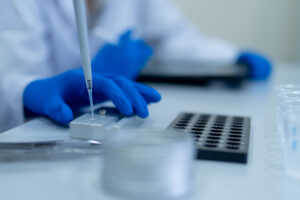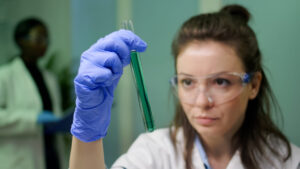There is no current genetic test available to diagnose autism. The exact cause of autism is still unknown, and up to 100 genes have been found to have some link to autism, but no single one has been identified as responsible for causing it. There is also the contribution of possible environmental features to it as well. Is autism genetic, is a question that just can not be answered currently.
However a diagnosis of autism, in a child or adult, may lead to a recommendation for genetic testing. This is because autism, and autistic-like behaviors, are often features of specific rare diseases.
Generally, a diagnosis of autism alone might not be considered enough to pursue genetic testing. Still, the presence of autistic-like behaviors, with other symptoms, such as unique or characteristic facial features, might be enough for a genetic counselor to recommend genetic testing.
What autistic features or autism-like behaviors might trigger genetic testing?
- Developmental delay
- Speech and language delay
- A lack of social interaction with others, including family members and peers
- A lack of understanding and use of social cues
- A need for routine, and the inability to handle even minor changes to this routine
- Avoidance of physical contact
- A focused interest in specific interests or activities, including repetitive behaviors
The combination of these autistic-like features may be the symptom of a rare disease if they also present with unique facial facials and other medical and health conditions.
What rare diseases present with autism-like features?
Pitt Hopkins syndrome
This rare disease is also often accompanied by an autism spectrum disorder diagnosis for some individuals diagnosed with the syndrome. Symptoms vary widely however between individuals with the same diagnosis. This rare disease is caused by a mutation in the TCF4 gene, and generally, the syndrome is not inherited but occurs spontaneously. Other features of the syndrome include developmental delay, intellectual impairment, and low muscle tone in infancy.
Williams-Beuren syndrome
This rare disease is caused by the absence of DNA on chromosome 7. Autistic-like symptoms are prevalent with this syndrome and include, language delay specifically, gross motor delay, hypersensitivity to sounds and other sensory impairments, as well as food issues and eating-related pickiness. Williams-Beuren also presents in individuals through very distinct facial features, and health conditions affecting the cardiovascular system.
Fragile X syndrome
This rare disease is inherited in an X-linked pattern and affects males much more severely than females because of this. It is estimated that anywhere between 15-20% of individuals with Fragile X also display autistic-like symptoms. These range from limited eye contact, extreme responses to sensory experiences, and speech and language delays. Other identifying features of the syndrome include a high palate, long face, low muscle tone, and flat feet.
Rett syndrome
This neurological rare disease presents with autistic-like behaviors and affects mainly females. Individuals with the syndrome have different brain pathologies and mapping than those diagnosed with autism spectrum disorder, but some of their behaviors are the same. These behaviors include repetitive movements including body rocking, and sleep difficulties. Individuals with the syndrome experience a regression in their development, including their emotional, physical, and cognitive development, as they grow older.
What should I do if I notice autistic-like behaviors in my child?
First and foremost, speak to your doctor. They will help you understand whether to pursue an autism diagnosis or not. They may also decide to suggest the option of genetic counseling, especially if they also identify other possible symptoms in your child that have no apparent cause.
A genetic counselor will be able to understand autistic-like features in a child and individual, within the context of a possible rare disease diagnosis, and recommend the best options for further investigation and genetic testing if deemed relevant.
Early intervention for children with autism spectrum disorder symptoms, and at the same time ensuring families and individuals receive this crucial support should be a priority for all medical teams and professionals. We recommend the Family Health Checker app, a secured free AI tool designed to help you assess your child’s developmental concerns from the comfort of your home. By using this innovative tool, you can gain valuable insights into your child’s development and connect with the right experts for further support. Check your child online with FDNA to take the first step toward understanding and addressing their unique needs.



